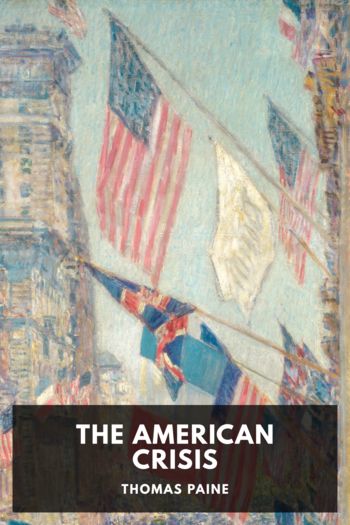The American Crisis, Thomas Paine [pdf to ebook reader TXT] 📗

- Author: Thomas Paine
Book online «The American Crisis, Thomas Paine [pdf to ebook reader TXT] 📗». Author Thomas Paine
The debt which America has contracted, compared with the cause she has gained, and the advantages to flow from it, ought scarcely to be mentioned. She has it in her choice to do, and to live as happily as she pleases. The world is in her hands. She has no foreign power to monopolize her commerce, perplex her legislation, or control her prosperity. The struggle is over, which must one day have happened, and, perhaps, never could have happened at a better time.56 And instead of a domineering master, she has gained an ally whose exemplary greatness, and universal liberality, have extorted a confession even from her enemies.
With the blessings of peace, independence, and an universal commerce, the states, individually and collectively, will have leisure and opportunity to regulate and establish their domestic concerns, and to put it beyond the power of calumny to throw the least reflection on their honor. Character is much easier kept than recovered, and that man, if any such there be, who, from sinister views, or littleness of soul, lends unseen his hand to injure it, contrives a wound it will never be in his power to heal.
As we have established an inheritance for posterity, let that inheritance descend, with every mark of an honorable conveyance. The little it will cost, compared with the worth of the states, the greatness of the object, and the value of the national character, will be a profitable exchange.
But that which must more forcibly strike a thoughtful, penetrating mind, and which includes and renders easy all inferior concerns, is the union of the States. On this our great national character depends. It is this which must give us importance abroad and security at home. It is through this only that we are, or can be, nationally known in the world; it is the flag of the United States which renders our ships and commerce safe on the seas, or in a foreign port. Our Mediterranean passes must be obtained under the same style. All our treaties, whether of alliance, peace, or commerce, are formed under the sovereignty of the United States, and Europe knows us by no other name or title.
The division of the empire into states is for our own convenience, but abroad this distinction ceases. The affairs of each state are local. They can go no further than to itself. And were the whole worth of even the richest of them expended in revenue, it would not be sufficient to support sovereignty against a foreign attack. In short, we have no other national sovereignty than as United States. It would even be fatal for us if we had—too expensive to be maintained, and impossible to be supported. Individuals, or individual states, may call themselves what they please; but the world, and especially the world of enemies, is not to be held in awe by the whistling of a name. Sovereignty must have power to protect all the parts that compose and constitute it: and as United States we are equal to the importance of the title, but otherwise we are not. Our union, well and wisely regulated and cemented, is the cheapest way of being great—the easiest way of being powerful, and the happiest invention in government which the circumstances of America can admit of.—Because it collects from each state, that which, by being inadequate, can be of no use to it, and forms an aggregate that serves for all.
The states of Holland are an unfortunate instance of the effects of individual sovereignty. Their disjointed condition exposes them to numerous intrigues, losses, calamities, and enemies; and the almost impossibility of bringing their measures to a decision, and that decision into execution, is to them, and would be to us, a source of endless misfortune.
It is with confederated states as with individuals in society; something must be yielded up to make the whole secure. In this view of things we gain by what we give, and draw an annual interest greater than the capital.—I ever feel myself hurt when I hear the union, that great palladium of our liberty and safety, the least irreverently spoken of. It is the most sacred thing in the constitution of America, and that which every man should be most proud and tender of. Our citizenship in the United States is our national character. Our citizenship in any particular state is only our local distinction. By the latter we are known at home, by the former to the world. Our great title is Americans—our inferior one varies with the place.
So far as my endeavors could go, they have all been directed to conciliate the affections, unite the interests, and draw and keep the mind of the country together; and the better to assist in this foundation work of the revolution, I have avoided all places of profit or office, either in the state I live in, or in the United States;57 kept myself at a distance from all parties and party connections, and even disregarded all private and inferior concerns: and when we take into view the great work which we have gone through, and feel, as we ought to feel, the just importance of it, we shall then see, that the little wranglings and indecent contentions of personal parley, are as dishonorable to our characters, as they are injurious to our repose.
It was the cause of America that made me an author. The force with which it struck my mind and the dangerous condition the country appeared to me in, by courting an impossible and an unnatural reconciliation with those who were determined to reduce her, instead of striking out into the only line that could cement and save her, A Declaration of Independence, made it impossible for me, feeling





Comments (0)